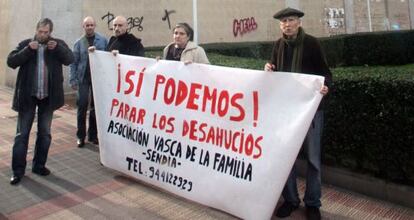PP will present Socialists with proposal to stop home evictions
A 53-year-old woman commits suicide on the day her property was to be repossessed Opposition wants proposed law to be retroactive to include those who already lost homes

The Popular Party (PP) administration will speed up reforms to mortgage legislation after a woman jumped out a six-story window in the Basque Country as she was going to be kicked out of her home on Friday. This is the second eviction-related suicide in recent weeks.
The Finance and Cabinet Ministries were completing a proposal that is scheduled to be presented to the opposition Socialists on Monday, detailing steps to help mortgagers in default. One specific measure would be to extend grace periods for social groups considered especially vulnerable.
While government and opposition hammer out new rules, the Socialists will also ask the banks to freeze all foreclosures currently underway. A few days ago it was assumed that any emerging legislation would not be retroactive, but a Socialist spokesman said on Friday that “we need to force the possibilities a little so that the new law is applied in all cases. We need to try to stop this.”
There have been over 350,000 evictions in the last four years in a country with extremely high home ownership levels. Meanwhile, the rate of job destruction will leave over six million Spaniards out of work by 2013, according to Brussels, meaning that growing numbers of people will be unable to meet their mortgage payments.
While judges complain that their hands are tied and all they can do is apply the law, society is coming up with innovative ways to fight the foreclosures. Also on Friday, the city of Santa Cruz de Tenerife managed to get Bankia to temporarily halt all local evictions by the simple technique of withdrawing 1.5 million euros from the lender, which was nationalized earlier this year to avoid bankruptcy. The move also ended a five-day hunger strike by a woman whose home was repossessed a month ago.
The 53-year-old woman who killed herself in Barakaldo on Friday, Amaya Egaña, was a former Socialist councilor who happened to be personal friends with the outgoing Basque premier Patxi López.
“Ravaged by the death of a friend. Evictions are becoming the cruelest face of the crisis,” he wrote on his Twitter account after learning of her suicide.
In recent days, a growing chorus of voices — most notably judges — has been demanding government measures to stop this dramatic situation.
The chief judge of the Barakaldo courts, Juan Carlos Mediavilla, on Friday asked for a change to mortgage legislation to prevent new tragedies. “It would be good if we all gave this some thought and quickly, without further delay, modify existing legislation so that we judges could later interpret and enforce the new norms that would allow us to address these situations in a better way,” he said.
The government’s decision to speed up reforms comes just a day after a European Union justice official found that Spanish mortgage laws violate community legislation because they do not guarantee consumer protection from potentially abusive contract clauses.
The Advocate General for the Court of Justice of the EU, Juliane Kokott, issued a report saying that Spanish judges should be able to suspend evictions until the abusive nature of one or more mortgage contract clauses can be confirmed. Currently, Spanish law does not allow for this possibility, but instead establishes that the issue of contractual abuse must be determined in a separate court case once the foreclosure has taken place.
The report commented on a specific case concerning an individual in Barcelona whose home was repossessed by CatalunyaCaixa in January 2011. Although the Advocate General’s reports are not binding, the court rules in the same way in 80 percent of cases.
Tu suscripción se está usando en otro dispositivo
¿Quieres añadir otro usuario a tu suscripción?
Si continúas leyendo en este dispositivo, no se podrá leer en el otro.
FlechaTu suscripción se está usando en otro dispositivo y solo puedes acceder a EL PAÍS desde un dispositivo a la vez.
Si quieres compartir tu cuenta, cambia tu suscripción a la modalidad Premium, así podrás añadir otro usuario. Cada uno accederá con su propia cuenta de email, lo que os permitirá personalizar vuestra experiencia en EL PAÍS.
¿Tienes una suscripción de empresa? Accede aquí para contratar más cuentas.
En el caso de no saber quién está usando tu cuenta, te recomendamos cambiar tu contraseña aquí.
Si decides continuar compartiendo tu cuenta, este mensaje se mostrará en tu dispositivo y en el de la otra persona que está usando tu cuenta de forma indefinida, afectando a tu experiencia de lectura. Puedes consultar aquí los términos y condiciones de la suscripción digital.








































